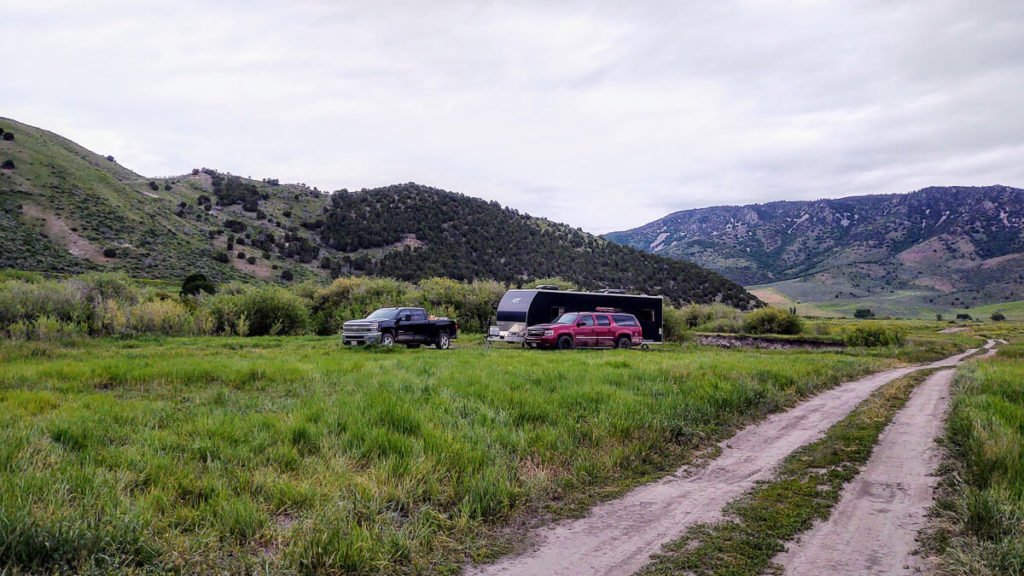Yes, it is very safe to leave your camper while boondocking. Very rarely do campers, RVs, and trailers get broken into or stolen when boondocking. In fact, we’ve never heard of boondockers experiencing this situation before.

Is it Safe to Leave Your Camper While Boondocking?
We’ve discussed before that boondocking is safer than staying at an RV park or campground. This is because criminals don’t venture out into forests and deserts looking for something to steal. They instead focus on high population areas where there is more to choose from.
If you’re worried about leaving your camper or RV unattended while boondocking, it’s normal to feel that way. But rest assured, you have more to worry about when leaving it unattended where there are more people around watching you.
How to Secure Your Camper From Getting Broken Into
Camp in a location obscured from view – Go further down forest roads and BLM roads until you get out of view from heavily trafficked areas. This is the best piece of advice towards securing your camper and vehicle. If you end up some place where you are still in view of a highway, or other campers, don’t go crazy trying to hide yourself. It’s practically unheard of for someone to come back from a day of hiking to find their camper gone.
Make your campsite look like its being used – Leave your camp chairs, fold-up table, your BBQ grill, patio mat, all outside looking like it’s set up for use. Don’t worry about people stealing these things, because they are not interested in them. Anyone wanting to break into your camper is likely looking for something more expensive, like a gun, boxes of ammo, cash, etc.
Set up a Ring camera on your camper door – This camera can’t stop someone from breaking in, but if they see it, and recognize it, they will know that they’ve already been captured on video by virtue of walking up close to it. That alone will discourage them from breaking in. (See it on Amazon)
Don’t establish a predictable pattern – If you think there are people scoping you out, then don’t establish the same pattern of leaving and returning. Always mix things up where some days you’re there all day long. When you do leave, choose different times of the day. If someone cannot predict a safe time to break in, they will likely move on.
Don’t tell other people about what you have – If you make a habit of telling other people about the 9mm Sig Sauer you keep in your trailer, or the 7500 watt portable generator you have running your air conditioning, don’t be surprised if you come back to find your RV was broken into. Keep your mouth shut and don’t brag.
Don’t tell other people about where you are camped – Just like with the above, you never know who are talking to when enjoying a visit into town. They might see the $1,500 cell phone in your hand, or the $800 turquoise necklace around your neck. Don’t let them know that you’re boondocking, and don’t let them know where you are.
Are there any special door and window locks? – Unfortunately, no. The problem is not having more locks, but that RV doors are very flimsy. These doors can be easily pried open no matter how many locks you have on them. Nearly all RVs and campers are made with the cheapest materials possible to keep costs down and profits up.
Keep your valuables with you – If thieves manage to break into your camper, you’ll be glad you kept your laptop, guns, cash, and anything else of value, in your car or truck, or packed away in your backpack.
How to Secure Your Trailer From Being Stolen
It’s very rare for a trailer to get stolen while boondocking. In fact, we’ve boondocked in places where we found other trailers that look like they’ve been camped there for weeks or months, and yet no one has stolen them or broken inside. Yet, it’s always a good idea to secure your trailer from being stolen…
Use a Hitch Coupler Lock – This is the most popular way trailer owners secure their rig. This lock attached to the hitch coupler on a trailer, or the kingpin on a fifth-wheel. There are dozens of different hitch locks, some offering more security than others, but costing a lot more too…
- Ft. Knox Locks makes the toughest hitch locks on the market for both fifth-wheel trailers and bumper pulls. (See it on Amazon).
- AMPLock makes heavy duty hitch locks that are very tough to crack or pick open. (See it on Amazon).
- Reese makes a line of traditional hitch locks that are very affordable but still more secure than cheaper knockoffs. (See it on Amazon)
Use a Wheel Lock – This is a brace and lock that attaches to one of the wheels on a trailer and prevents it from turning, thus securing it from being stolen. If your trailer has two or more axles, make sure its attached to the axle furthest to the rear.
- Trimax makes a popular lock called, “Wheel Chock Lock” that runs about $100.00 for two locks. (See it on Amazon).
Locking Wheel Stabilizers – These are braces for trailers with two or more axles. The brace sits between two wheels in the shape of a Letter X. There are some braces that come with locks to prevent a trailer from being towed.
- Mahler Gates makes the most popular brand of locking wheel stabilizers. (See it on Amazon).

